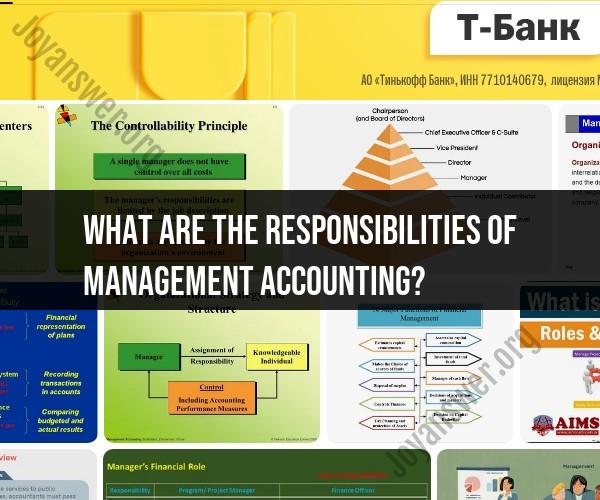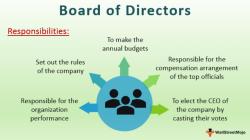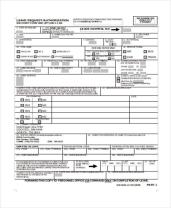What are the responsibilities of Management Accounting?
Management accounting involves providing financial information and analysis to help managers make informed business decisions. Here are the key responsibilities of management accounting:
1. Budgeting and Forecasting
- Preparation of Budgets: Developing detailed financial plans that estimate future revenues and expenses.
- Forecasting: Predicting future financial outcomes based on historical data, current trends, and planned activities.
2. Cost Management
- Cost Analysis: Determining the costs of business activities to help manage and reduce expenses.
- Cost Allocation: Assigning indirect costs to various departments, products, or projects to accurately reflect their profitability.
- Standard Costing: Establishing standard costs and analyzing variances between actual and standard costs.
3. Performance Measurement
- Key Performance Indicators (KPIs): Developing and tracking KPIs to measure the effectiveness and efficiency of various business operations.
- Variance Analysis: Comparing actual performance to budgeted figures to identify and explain variances.
- Balanced Scorecard: Implementing a balanced scorecard approach to evaluate performance across multiple perspectives, including financial, customer, internal processes, and learning and growth.
4. Financial Reporting
- Internal Reports: Preparing detailed financial reports for internal use by management to support decision-making.
- Segment Reporting: Providing financial information for different segments of the business, such as departments, product lines, or geographical areas.
5. Strategic Planning
- Long-term Planning: Assisting in the development of long-term strategic plans by providing financial insights and projections.
- Scenario Analysis: Evaluating the financial implications of different strategic options and scenarios.
6. Decision Support
- Financial Analysis: Conducting analyses to support business decisions, such as investment appraisals, product pricing, and cost-benefit analyses.
- Capital Budgeting: Evaluating and prioritizing capital expenditure projects based on their potential returns and alignment with strategic goals.
7. Risk Management
- Identifying Risks: Recognizing financial and operational risks that could impact the organization.
- Mitigation Strategies: Developing strategies to mitigate identified risks and ensuring they are implemented effectively.
8. Compliance and Governance
- Regulatory Compliance: Ensuring that the organization adheres to relevant financial regulations and standards.
- Internal Controls: Establishing and maintaining effective internal controls to safeguard assets and ensure the accuracy of financial information.
9. Resource Allocation
- Optimal Use of Resources: Analyzing and recommending the optimal allocation of resources to achieve organizational goals.
- Efficiency Improvements: Identifying areas where efficiency can be improved and implementing measures to enhance productivity.
10. Communication
- Reporting to Management: Communicating financial information and insights to management in a clear and actionable manner.
- Collaboration: Working closely with other departments to ensure financial considerations are integrated into all business decisions.
By fulfilling these responsibilities, management accountants play a crucial role in guiding an organization's financial strategy and ensuring its financial health and sustainability.
What are the primary duties and obligations of Management Accounting within an organization?
Management accounting focuses on internal financial information used by managers to make operational decisions. Here are some primary duties and obligations of management accountants within an organization:
Providing Cost Information: Management accountants generate reports and analyses that detail the costs associated with various aspects of the business. This could include production costs, marketing costs, or administrative costs. This information helps managers understand where their money is going and make informed decisions about resource allocation and pricing strategies.
Budgeting and Planning: Management accountants play a key role in the budgeting process. They help develop realistic and achievable financial plans for the organization, considering factors like historical data, market trends, and strategic goals. They also monitor performance against the budget and provide regular updates to management.
Financial Analysis and Interpretation: Management accountants analyze financial data to identify trends, assess risks, and evaluate the financial performance of the organization. They translate complex financial information into clear and concise reports that managers can easily understand and use to make data-driven decisions.
Cost Management and Control: Management accountants develop and implement systems to track and control costs. This might involve variance analysis to identify areas where spending deviates from the budget and develop strategies to optimize costs and improve efficiency.
Performance Measurement: Management accountants design and implement performance measurement systems to track progress towards goals and objectives. They identify key performance indicators (KPIs) that align with the organization's strategy and monitor those metrics to assess the effectiveness of various initiatives.
Decision Support: Management accountants are business partners to other departments within the organization. They provide financial expertise and insights to support managers in making strategic decisions about everything from product development and marketing to operational processes and resource allocation.
Compliance: While not the primary focus, management accountants may also be involved in ensuring adherence to accounting regulations and standards as they pertain to internal financial reporting.
In summary, management accountants are critical partners in an organization's financial health and operational effectiveness. They provide the financial information, analysis, and insights that managers need to make sound decisions, control costs, and achieve business goals.












